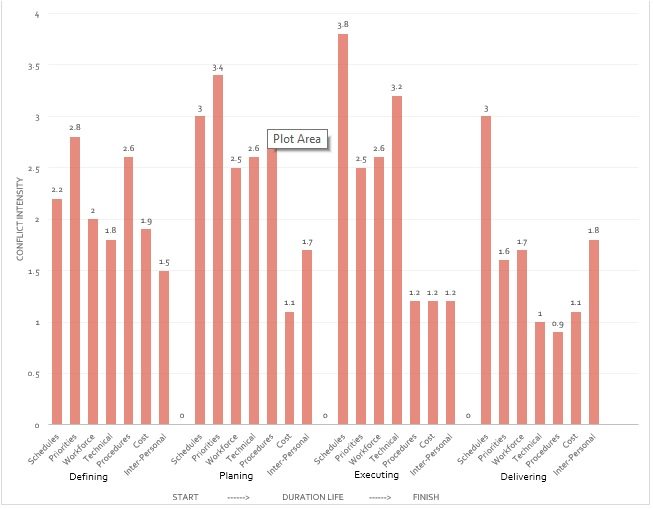Disagreements and conflicts naturally emerge within a project team during the life of the project. Participants will disagree over priorities, allocation of resources the quality of specific work, solutions to discovered problems, and so forth. Some conflicts support the goals of the group and improve project performance. Effectively managing conflicts within the project is critical and every project manager should aim to improve their conflict management skills.
For example, two members may be locked in a debate over a design trade-off decision involving different features of a product. They argue that their preferred feature is what the primary customer truly wants.
This disagreement may force them to talk to or get more information from the customer, with the result that they realize neither feature is highly valued, but instead the customer wants something else.
On the other hand, conflicts can also hinder group performance. Initial disagreements can escalate into heated arguments with both parties storming out of the room and refusing to work together.
Thamhain and Wilemon’s research revealed that the sources of conflict change as projects progress along the project life cycle.
The figure below summarizes the major sources of conflict in each phase.
Managing Conflicts During Project Definition
The most significant sources of conflict are priorities, administrative procedures, schedule, and workforce. Disputes occur over the relative importance of the project compared with other activities, which project management structure to use (especially how much control the project manager should have), the personnel to be assigned, and the scheduling of the project into existing workloads.
Managing Conflicts During the Planning Phase
The chief source of conflict remains priorities, followed by schedules, procedures, and technical requirements. This is the phase where the project moves from a general concept to a detailed set of plans. Disagreements often emerge over the final schedule, the availability of resources, communication and decision making procedures, and technical requirements for the project.
Managing Conflicts During the Execution Phase
Friction arises over schedule slippage, technical problems, and staff issues. Milestones become more difficult to meet because of accumulating schedule slippages. This leads to tension within the team as delays prevent others from starting or completing their work.
Managing the trade-offs between time, cost, and performance becomes paramount. Project managers must decide between letting the schedule slip, investing additional funds to get back on track, or scaling back the scope of the project in order to save time.
Technical problems involve finding solutions to unexpected problems and integrating the contributions of different people. The strain of the project may be expressed in interpersonal conflicts as well as pressures to use resources more effectively.
Managing Conflicts During the Delivery Phase
Schedules continue as the biggest source of conflict as schedule slippages make it more difficult to meet target completion dates. Pressures to meet objectives coupled with growing anxiety over future assignments increases interpersonal tensions. Technical problems are rare since most of them have been worked out during the earlier phases.
To gain more insights on managing conflicts I recommend reading there two articles: Manage Dysfunctional Conflict Easily Using This 5 Step Framework and Do You Encourage Functional Conflict?
Hope you enjoyed the article. For any questions and ideas please use the comment box below.
Image courtesy of Freepik.
References and source of the article: Larson and Gray, Project management: The managerial process

